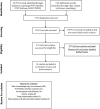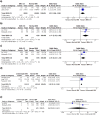Systematic review and meta-analysis of female lifestyle factors and risk of recurrent pregnancy loss
- PMID: 33782474
- PMCID: PMC8007745
- DOI: 10.1038/s41598-021-86445-2
Systematic review and meta-analysis of female lifestyle factors and risk of recurrent pregnancy loss
Abstract
It is known that lifestyle factors affect sporadic miscarriage, but the extent of this on RPL (recurrent pregnancy loss) is less well known. A systematic review and meta-analysis was performed to assess the associations between lifestyle factors and RPL. Studies that analysed RPL in the context of BMI, smoking, alcohol and caffeine intake were included. The primary and secondary outcomes were odds of having RPL in the general population and odds of further miscarriage, respectively. Underweight and women with BMI > 25 are at higher odds of RPL in the general population (OR 1.2, 95% CI 1.12-1.28 and OR 1.21, 95% CI 1.06-1.38, respectively). In women with RPL, having BMI > 30 and BMI > 25 has increased odds of further miscarriages (OR 1.77, 95% CI 1.25-2.50 and OR 1.35, 95% CI 1.07-1.72, respectively). The quality of the evidence for our findings was low or very low. Being underweight and BMI > 25 contributes significantly to increased risk of RPL (general population). BMI > 25 or BMI > 30 increases the risk of further miscarriages (RPL population). Larger studies addressing the effects of alcohol, cigarette smoking and caffeine on the risk of RPL with optimisation of BMI in this cohort of women are now needed.
Conflict of interest statement
The authors declare no competing interests.
Figures



Similar articles
-
[Analysis of Risk Factors for Recurrent Pregnancy Loss in Patients Undergoing in vitro Fertilization-Embryo Transfer].Sichuan Da Xue Xue Bao Yi Xue Ban. 2024 May 20;55(3):724-730. doi: 10.12182/20240560102. Sichuan Da Xue Xue Bao Yi Xue Ban. 2024. PMID: 38948280 Free PMC article. Chinese.
-
Recurrent pregnancy loss and obesity.Best Pract Res Clin Obstet Gynaecol. 2015 May;29(4):489-97. doi: 10.1016/j.bpobgyn.2014.12.001. Epub 2014 Dec 24. Best Pract Res Clin Obstet Gynaecol. 2015. PMID: 25589398
-
Diminished ovarian reserve in recurrent pregnancy loss: a systematic review and meta-analysis.Fertil Steril. 2020 Apr;113(4):818-827.e3. doi: 10.1016/j.fertnstert.2019.11.014. Epub 2020 Mar 4. Fertil Steril. 2020. PMID: 32145928
-
Pregnancy outcomes following in vitro fertilization frozen embryo transfer (IVF-FET) with or without preimplantation genetic testing for aneuploidy (PGT-A) in women with recurrent pregnancy loss (RPL): a SART-CORS study.Hum Reprod. 2021 Jul 19;36(8):2339-2344. doi: 10.1093/humrep/deab117. Hum Reprod. 2021. PMID: 34027546
-
Preconception lifestyle advice for people with infertility.Cochrane Database Syst Rev. 2021 Apr 29;4(4):CD008189. doi: 10.1002/14651858.CD008189.pub3. Cochrane Database Syst Rev. 2021. PMID: 33914901 Free PMC article.
Cited by
-
The effect of paternal and maternal factors on the prognosis of live birth in couples with recurrent pregnancy loss.Acta Obstet Gynecol Scand. 2022 Dec;101(12):1374-1385. doi: 10.1111/aogs.14469. Epub 2022 Oct 9. Acta Obstet Gynecol Scand. 2022. PMID: 36210542 Free PMC article.
-
Understanding trimester-specific miscarriage risk in Indian women: insights from the calendar data of National Family Health Survey (NFHS-5) 2019-21.BMC Womens Health. 2024 Jan 23;24(1):63. doi: 10.1186/s12905-023-02838-7. BMC Womens Health. 2024. PMID: 38263129 Free PMC article.
-
Primary versus secondary recurrent pregnancy losses: Clinical findings and live birth rate after comprehensive work-up and personalized management.Acta Obstet Gynecol Scand. 2025 Apr;104(4):697-706. doi: 10.1111/aogs.15050. Epub 2025 Jan 21. Acta Obstet Gynecol Scand. 2025. PMID: 39835653 Free PMC article.
-
Recurrent Pregnancy Loss Etiology, Risk Factors, Diagnosis, and Management. Fresh Look into a Full Box.J Clin Med. 2023 Jun 15;12(12):4074. doi: 10.3390/jcm12124074. J Clin Med. 2023. PMID: 37373766 Free PMC article. Review.
-
Recurrent Miscarriage: Diagnostic and Therapeutic Procedures. Guideline of the DGGG, OEGGG and SGGG (S2k-Level, AWMF Registry No. 015/050, May 2022).Geburtshilfe Frauenheilkd. 2022 Nov 25;83(1):49-78. doi: 10.1055/a-1895-9940. eCollection 2023 Jan. Geburtshilfe Frauenheilkd. 2022. PMID: 37415921 Free PMC article.
References
-
- ESHRE Early Pregnancy Guideline Development Group. Recurrent Pregnancy Loss. Version 2 (2017).
Publication types
MeSH terms
LinkOut - more resources
Full Text Sources
Other Literature Sources

